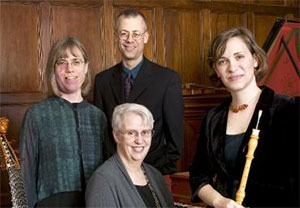by Mike Telin
Today’s
On Saturday, November 10 beginning at 8:00 pm at William Busta Gallery and Sunday, November 11 beginning at 4:00 pm in Herr Chapel at Plymouth Church, Les Délices presents Pocket Opera, featuring works by Jean-Philipp Rameau.
“There’s always been something unrealistic about the protagonists of a serious drama singing and dancing their way through the course of an evening”, says Nagy, “but opera didn’t seem nearly so implausible as long as the subjects were gods, allegorical or legendary figures. And the worlds of myths and legends provided opportunities for merveilleux, to take the form of hell scenes, battles between jealous gods, sea monsters, or other “unnatural” disasters.”
The program also features the largest ensemble to date for a Les Délices performance, including Kathie Stewart, traverso, Debra Nagy, baroque oboe, Julie Andrijeski & Scott Metcalfe, violins, Emily Walhout & Doug Kelley, violas da gamba and Michael Sponseller, harpsichord.
“It is the big orchestral pieces from Rameau’s rich operatic oeuvre that inspired the program. Rameau was an innovator who was ultimately credited with bringing about a revolution in opera and French music in general,” Nagy points out. “But despite the critical furor that Rameau’s early operas incited, they were all popular successes.”
Nagy goes to say that the program brings together all the traditional elements of a Tragédie lyrique, from a great overture, to excerpts from delightful divertissements, the jealousy and anger of gods made manifest by storms, earthquakes, and sea monsters, noble self-sacrifice coupled with divine intervention, characterizations of exotic cultures and civilized “savages,” and finally a happy ending where love conquers all.
As Debra Nagy explains, the drama unfolds in the following manner:
“Pocket Opera begins with as one might expect, with an Ouverture representing the struggle between good and evil personified by the high priest Zoroaster and the evil magician Abramane.
“Next up, four selections from Rameau’s final opera, Les Boréades, which centers around Alphise, Queen of Bactria who must choose a husband descended from Boreas, King of the North Wind. But of course Alphise is in love with a man of unknown lineage and her attempt to abdicate the throne is met with drama as she is kidnapped by the north winds.
“Hippolyte et Aricie, Rameau’s first opera, is intense from beginning to end. Full of sea monsters and storms, the opera contains a Hell scene that at the time of its premiere was so controversial that it could not be performed.
“Castor et Pollux has a positive message as well as a truly happy ending. The opera’s namesake twin brothers manage to overcome fate and mortality through love and willing self-sacrifice. The music, which was arranged by Ludwig Hesse, who was one of the last great viol virtuosi of the 18th century, fits perfectly into our theme of adapting dramatic music for performance in the salon.
“Les Indes Galantes is the only non-Tragédie featured in the program and consists of a prologue and independent entrees. Each entree depicts a far-flung, exotic location – Turkey, Peru, Persia, and the forests of North America.
“And finally, we arrive at love, peace and celebration with the chaconne from the 1744 version of Dardanus. At the end of a rather absurd and overly complex plot, Dardanusand his love Iphise are happily wedded.”
If you’re wondering why Les Délices has chosen to perform a program of orchestral music using reduced forces, Debra Nagy says, “the short answer is: because it’s great music. The longer explanation is that in the eighteenth century, people from nearly all walks of life sought to find ways to take elements of the operatic experience home with them”.
Published on ClevelandClassical.com November 6, 2012
Click here for a printable version of this article.


